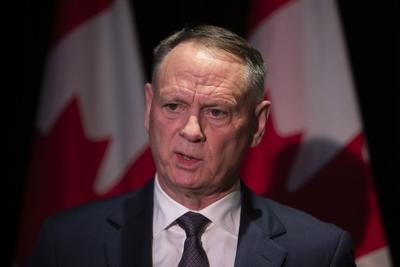OTTAWA - The Liberal government on Friday reintroduced legislation to reform the military justice system that died in the last Parliament.
The legislation would remove the militaryŌĆÖs ability to investigate and prosecute alleged sexual offences within Canada under the Criminal Code, and turn it over to civilian authorities.
Defence Minister David McGuinty said Bill C-11 would lead to “significant and profound changes” meant to increase trust in the justice system and speed up the prosecution of cases.
“It’s very important for any victim that may be subject to this kind of nefarious and unacceptable and deplorable behaviour ŌĆ” to remember that they have to be able to trust the system,” McGuinty told reporters after the bill was introduced in the House of Commons.
“They need to have the confidence that it’s transparent, predictable, that they have the support that they need to come forward and to reveal what has happened to them.”
McGuinty said the proposed changes to the National Defence Act would establish a “very solid floor on which to build” and he hopes the legislation will win support from all parties.
Under the bill, Canadian civilian police would not have jurisdiction to investigate crimes involving military members deployed abroad.
The measures were put forward previously in the House of Commons last year as Bill C-66.
That legislation died when then-prime minister Justin Trudeau prorogued Parliament at the start of the year.
The new bill and the old one are virtually identical.
The bill is a response to recommendations made in 2021 in two independent reports by former Supreme Court justices Louise Arbour and Morris Fish on reforming and modernizing the military justice system.
Arbour said at the time she had heard ŌĆ£significant skepticism on the part of stakeholders and most importantly survivors with respect to the independence and competenceŌĆØ of military police.
Arbour called on the government to take sexual assault cases away from the military police ŌĆö a change first recommended by Fish, whose earlier review of the military justice system found serious issues with its ability to handle sexual offences.
In 2021, then-defence minister Anita Anand moved to accept Arbour’s recommendation without formally changing the law.
Since then, all domestic cases of sexual offences within the Canadian Armed Forces have been dealt with by local police, McGuinty said.
The new legislation also follows through on Fish’s call for a new process to appoint three important military justice positions: director of military prosecutions, the director of defence counsel services and the provost marshal. Fish argued that those positions need to be insulated from pressure by military brass.
The Conservatives, NDP and Bloc all expressed some level of support after C-66 was introduced last year.
But the Conservatives also argued that the legislation would add more positions that would be appointed by cabinet, which they said would open the door to political interference in military affairs.
Conservative defence critic James Bezan also told the House on Sept. 18 of last year that eliminating military oversight of sexual assault cases domestically would lead to a loss of investigative expertise ŌĆö even though those military officials would still have to investigate cases outside the country.
“Whenever our troops are deployed out of Canada, we are still going to be in a situation where they are going to be the lead investigators and lead prosecutors, as well as the defendants,” Bezan said at the time.
“If they are not good enough to prosecute and investigate sexual misconduct within the Canadian Armed Forces when it happens here in Canada, how do we know we can trust them for cases outside Canada? I know I do, but I wonder if the minister is at all concerned about the atrophy of those skills.”
Advocates and survivors of sexual abuse have also raised concerns about moving these cases onto an already strained civilian justice system.
McGuinty said the federal government signed an agreement with Ontario to begin preparing the justice system for more cases, and he sees that as a model for working with other provinces.
“We’re going to continue to build and negotiate with the police of local jurisdiction, with provincial authorities ŌĆö the (Ontario Provincial Police), S├╗ret├® du Qu├®bec for example ŌĆö and we will impress upon them the need to be able to help us with this regard,” he said.
ŌĆö With files from Sarah Ritchie┬Ā
This report by The Canadian Press was first published Sept. 26, 2025.
Error! Sorry, there was an error processing your request.
There was a problem with the recaptcha. Please try again.
You may unsubscribe at any time. By signing up, you agree to our and . This site is protected by reCAPTCHA and the Google and apply.
Want more of the latest from us? Sign up for more at our newsletter page.


























To join the conversation set a first and last name in your user profile.
Sign in or register for free to join the Conversation